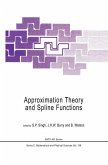Spline functions entered Approximation Theory as solutions of natural extremal problems. A typical example is the problem of drawing a function curve through given n + k points that has a minimal norm of its k-th derivative. Isolated facts about the functions, now called splines, can be found in the papers of L. Euler, A. Lebesgue, G. Birkhoff, J. Favard, L. Tschakaloff. However, the Theory of Spline Functions has developed in the last 30 years by the effort of dozens of mathematicians. Recent fundamental results on multivariate polynomial interpolation and multivari ate splines have initiated a new wave of theoretical investigations and variety of applications. The purpose of this book is to introduce the reader to the theory of spline functions. The emphasis is given to some new developments, such as the general Birkoff's type interpolation, the extremal properties of the splines and their prominant role in the optimal recovery of functions, multivariate interpolation by polynomials and splines. The material presented is based on the lectures of the authors, given to the students at the University of Sofia and Yerevan University during the last 10 years. Some more elementary results are left as excercises and detailed hints are given.
Hinweis: Dieser Artikel kann nur an eine deutsche Lieferadresse ausgeliefert werden.
Hinweis: Dieser Artikel kann nur an eine deutsche Lieferadresse ausgeliefert werden.








